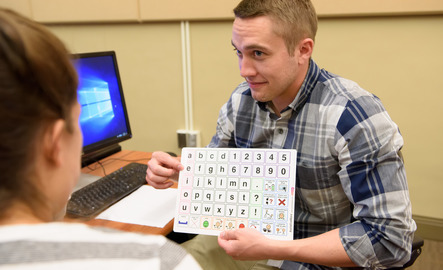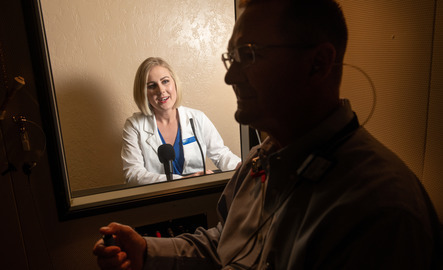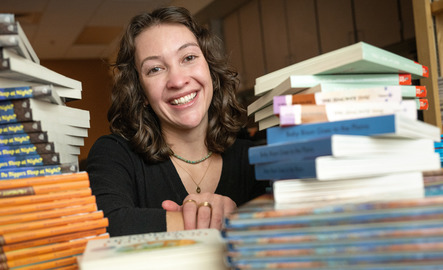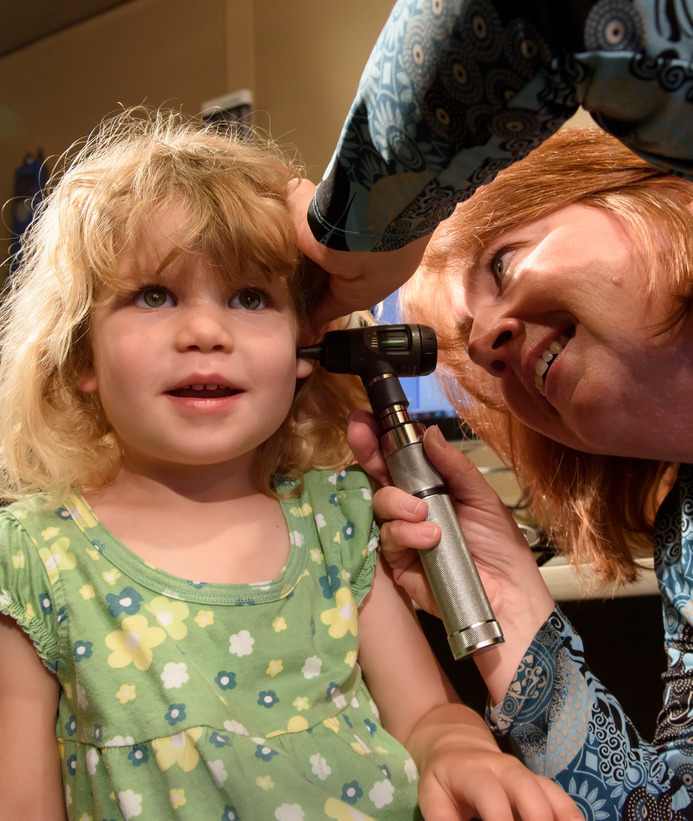About the Speech, Language and Hearing Science Program
Students in this program will have opportunities for didactic learning with clinical
application, problem-solving and critical thinking. They will also have opportunities
to contribute to scholarly inquiry and research in communication disorders. Students
will receive education regarding ethical standards and cultural sensitivity in the
provision of services and will participate in the University of Wyoming community
through interdisciplinary and interprofessional educational programs.
You will gain foundational knowledge in communication sciences and disorders with
these classes and more at the University of Wyoming:
- Anatomy and Physiology of Speech, Swallowing and Hearing
- American Sign Language
- Phonetics
- Aural Rehabilitation
- Neurological Basis of Communication
View the full Speech, Language and Hearing bachelor’s degree curriculum.

Students in this program gain the prerequisite courses and foundational knowledge that will strengthen their applications to graduate programs in communication sciences and disorders.
- If you choose to be a speech-language pathologist, you will need a master's degree. Following your bachelor's degree, you can apply for a position in our accredited master's program in speech-language pathology where you will gain clinical knowledge and skills for educational and medical practice.
- If you prefer audiology, you will need a doctorate degree (Au.D.) that can be earned at other institutions. As a first step, you will gain foundational knowledge with our bachelor's degree. You will take American Sign Language 1 & 2, Basic Audiology and Aural Rehabilitation, in addition you can apply for an Audiology Internship your senior year. Through these experiences you will gain a basic understanding of the types of hearing loss, audiometric testing, recommendations and fitting of hearing devices and educating the public about hearing. We also will help you identify Au.D. programs in the region that may be part of your next step in becoming and audiologist.

The Bachelor of Science in Speech, Language and Hearing Science provides students
with a broad-based foundation in the sciences and humanities, fundamental knowledge
of human communication, communication development and the nature of communication
disorders across the lifespan. The BS degree does not prepare students for licensure
as speech-language pathology assistants, further training is needed for that endorsement.
The BS degree prepares students for application to advanced degree programs in speech-language
pathology or audiology as well as other allied career fields.
1. Students will be able to identify basic human communication and swallowing processes.
Mastery of this skill will be demonstrated by:
- Locating essential anatomical structures and areas
- Describing implicated physiology
- Explaining acoustic and linguistic aspects of communication
2. Students will examine client profiles, identify relevant features, and evaluate
possible clinical options
Mastery of this skill will be demonstrated by:
- Classifying common disorder features
- Contrasting and differentiating patient profiles and sociocultural variables
- Appraising possible remediation strategies to address communication disorders
3. Students will demonstrate discipline-specific communication skills and potential
for professionalism
Mastery of this skill will be demonstrated by:
- Applying tenets of professional tone and demeanor in communication with colleagues, supervisors, and patients/clients and their caregivers
- Examining professional ethics and critiquing their application
- Critiquing and formulating clinical documentation

What can you do with a Speech, Language and Hearing Science degree?
A degree in Speech, Language and Hearing Science prepares you for careers focused on communication, hearing and speech disorders. Graduates often go on to work in healthcare, education or research settings. Common career paths include becoming a speech-language pathologist, audiologist, hearing aid specialist, speech or hearing technician or working as a rehabilitation aide. This degree also provides a strong foundation for graduate study in speech-language pathology, audiology or related fields. You’ll be equipped to help people of all ages improve their communication and quality of life.
Graduate education and training programs our B.S. alumni have pursued:
- Speech Language Pathologist
- Audiologist
- Physician
- Special Education Teacher
- Physical Therapist
- Neuropsychologist
- Professor
- Vocal Performance Coach
- Rehabilitation Counselor
- Social Worker
While most students pursue speech-language pathology or audiology graduate programs, there are many allied professions and careers you may be interested in.
Speech, language and hearing scientists study how humans communicate, how communication develops and what happens when it breaks down. They research the biological, cognitive and social aspects of speech, language and hearing, often using tools like brain imaging, acoustic analysis or behavioral testing. Their work helps improve the diagnosis and treatment of disorders such as stuttering, aphasia, language delays and hearing loss. Many work in research institutions, universities or clinical settings, contributing to advances in therapies, hearing technology and communication aids.
Yes, speech-language pathology is a strong and rewarding career. It offers high job demand, good salaries, and the chance to make a real difference in people's lives by helping them improve their communication and swallowing abilities. Speech-language pathologists (SLPs) work in diverse settings—like schools, hospitals, clinics and private practice—and often enjoy flexible schedules and opportunities for specialization.
From UW to Audiology
Meet a proud third-generation UW graduate who turned her passion for communication into a meaningful career as an audiologist. After earning her doctorate, she returned to Goshen County to live, work and raise a family—committed to connecting her community through better hearing and communication. Her journey highlights one of the two main paths students in Speech, Language and Hearing Science often take—either audiology or speech-language pathology—both of which require graduate study and lead to rewarding, impactful careers.
"I was provided many opportunities to not only expand my clinical knowledge but to develop my own research projects."
- Kyliah Ferris | Speech, Language and Hearing Science BS, 2018 | MS in Speech-Language Pathology, 2020


